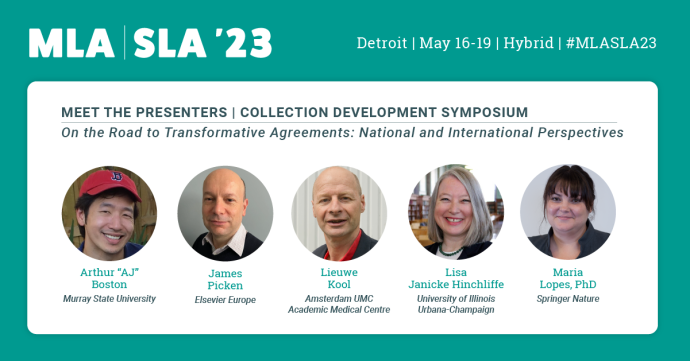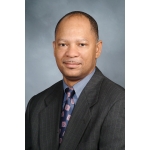Every week until MLA | SLA '23 in Detroit, we'll profile the experts leading each of the six Symposium sessions by sharing their answers to questions about themselves and their session.
We end the series with the On the Road to Transformative Agreements: National and International Perspectives: panelists: AJ Boston (AB), James Picken (JP), Lieuwee Kool (LK), Lisa Janicke Hinchliffe (LH), and Maria Lopes (ML).
Join them for their session on Thursday, May 18, 9:00 a.m. - 10:30 a.m., local time in Detroit, or view the session streamed live. To learn about all the Symposium sessions and their presenters, please see the Symposium Session Schedule.
What are you most looking forward to seeing/eating/experiencing in Detroit?
AB: My time in Detroit will be incredibly brief, and my view will be limited to what I can see from Uber trips between the hotel and airport. Fortunately, I am interested in experiencing the layout of the city. Dan Charnas described Detroit's grid structure in Dilla Time, his excellent 2022 biography of music producer James "J. Dilla" Dewitt Yancey. Dilla was a Detroit native who changed the sound of popular neo-soul and hip-hop at the turn of the century by, among other innovations, experimenting with the rhythmic time-feel that the Akai MPC drum machine can produce. I look forward to seeing the physical infrastructure that shaped Dilla's perspective.
JP: There isn’t just one thing I’m looking forward to most. Detroit is one of Time’s top 50 greatest places to explore in 2022, and I’m looking forward to experiencing the whole package. High expectations!
LK: I play an old Fender jazz bass, bought in 1978, and it always feels like coming home when I enter the US. I am really looking forward to experiencing the Motown groove in Detroit. I'd love to have that feeling enter my playing. Maybe a miracle will happen!
LH: I'll only have a little bit of time in town, but every time I’m in Detroit, I try to visit one of the great Middle Eastern/Lebanese restaurants in the area.
ML: I grew up supporting the Detroit Pistons, and I am very excited to be visiting Detroit. Although there is much to see, I will be sure to make my way to the Food Market so I can sample the food and take pictures of the art there at the request of my brother, a graffiti artist back in Portugal.
What’s a fun or surprising fact about transformative agreements?
AB: Many critics of transformative agreements point out that these deals normalize a system in which authors or their institutions pay to publish content. This is true, but it can feel surprising to recall that the default structure is one in which individuals or institutions pay to read content, a problem for which TAs can be seen as a partial solution.
JP: Transformative Agreements mean different things to different people. There’s no one-size-fits-all.
LK: Transformative agreements are challenging. Opening up “closed publications” is only the beginning of furthering Open Science. But we need to take a step-by-step approach that focuses first on making sure researchers are aware of agreements in place. It is surprising how much simple details like irrelevant mentions of prices on a website can influence authors' decisions.
LH: I think one surprising aspect is the degree to which they drive reading of closed content. See my piece in The Scholarly Kitchen about this if you want to know more.
ML: They are ever-evolving, and the reasons to sign one are very diverse.
For librarians: What’s an interesting fact about libraries that publishers would be surprised by?
AB: Great question. Libraries are publishers' primary clientele, and many publishing people have library work histories. I honestly don't know!
LK: Their thoroughness: libraries tend to be a lot better at maintaining accurate holding and publication data!
LH: Probably, contrary to reputation, how noisy and chaotic they are!
For publishers: What’s an interesting fact about libraries that publishers would be surprised by?
JP: Librarians are very smart people. I’m not sure I can surprise too many of them, but there are often surprised looks when I go into detail about how much goes into publishing peer-reviewed research. From building communities, soliciting submissions, editing, and managing the peer review process to production, dissemination, investment in platforms, and a commitment to archiving in perpetuity, there’s a huge amount that has to take place to publish an article.
ML: We have more in common than sets us apart.
How did you get started in libraries or publishing?
AB: I was hired as a circulation manager for my local public library almost exactly ten years ago. In my first week, our library implemented a new OPAC (Online Public Access Catalog) and hosted day one of the children's summer reading program. Any idea I had that libraries were quiet or slow places was dispelled almost instantaneously.
JP: I loved to travel and worked at a travel publisher part-time when I was younger. Then I tested out various types of publishers with short stints at The Economist and Time Warner. Academic publishing is where I found my calling.
LK: When I started working for Libraries 30 years ago, I didn't expect to get here.
LH: I discovered the profession as a student assistant in the library of my undergraduate institution. My foray into publishing came later, as a practicing librarian pursuing my scholarship.
ML: Totally by chance, I was looking for a job in production management and ended up being offered a 12-month contract in Marketing at MCB University Press (now Emerald), and that was it! Starting with a smaller publisher really allowed me to learn the entire publishing process and find the area that best suited my skill set.
What’s the most rewarding part of working with librarians or publishers?
AB: Nearly every publishing employee I've ever interacted with has been thoughtful and pleasant. While I don't love transformative agreements, I do take heart that their existence is an example of publishers' willingness to listen to outside-the-box ideas developed in libraries.
JP: Getting to know and understand so many diverse perspectives.
LK: Public-private collaboration can be challenging: We differ in culture and perhaps perceive different goals (making a profit vs. helping science improve society). But in the end, we both help scientists and do it with a positive mindset. The collaboration is energizing too!
LH: I enjoy working together to solve problems in order to support the learners and researchers we both seek to serve.
ML: The friendships I made over the years.
What’s the main thing you hope participants will take away from your contribution to the session?
AB: While transformative agreements may help some institutions achieve some immediate goals, it is not a solution we want to stick with long-term. Sign one if you feel you must but please be ready to pivot to something different very soon.
JP: We all support an open future and we’re on a journey to find the best way to get there.
LK: “Transformative” is far more important than “agreement.” Of course, an agreement on a national scale has a larger impact than local initiatives. Any article published open access helps the transition, so even if you work in a small hospital with just a few publications, be transformative!
LH: I hope that attendees will take away the perspective that transformative agreements are a tool for advancing toward certain goals and are ill-fitted for other goals. Thus, it is important to be clear on one's goals before assessing the utility of a transformative agreement.
ML: No matter whom you represent or where you are from, you have an important role to play in the transformation to Open Science.
Read Shifting into Second Gear: The 2nd Symposium on Collection Development & Resource Sharing: Meet the Presenters, Part 4




